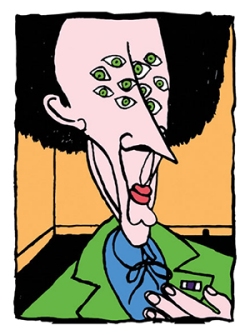I started to get interested in Kurt Vonnegut a couple of weeks ago, and the more I read about his books the more I felt the desire to start reading. My interest is especially focused on the level of meta-fiction, for example on the character Kilgore Trout that ends up appearing in a number of different novels.
 I enjoy these kinds of meta levels, but in those cases where they are not a self-serving gimmick, like a thread that ties together all the works of an author. A message embedded in a certain worldview. I perceive an intriguing level of mythology in this, with a curious idea of time. Kurt Vonnegut has been defined humanist, which makes this level of metafiction and metaphysics quite interesting because it’s obviously not the proclamation of a “belief”. It’s instead the search for meaning where there can be none.
I enjoy these kinds of meta levels, but in those cases where they are not a self-serving gimmick, like a thread that ties together all the works of an author. A message embedded in a certain worldview. I perceive an intriguing level of mythology in this, with a curious idea of time. Kurt Vonnegut has been defined humanist, which makes this level of metafiction and metaphysics quite interesting because it’s obviously not the proclamation of a “belief”. It’s instead the search for meaning where there can be none.
(and there are a number of “conceits” that are in common with the stuff I’m reading and writing about in the last months, such as: determinism, free will and time loops. As well as a number of “framing” devices and various playful “meta” structures that I always loved)
Considering where it was better to start reading, and considering that I was going to focus in particular on Kilgore Trout, I noticed a Library of America edition that collected all four of the novels I was interested in the most: “Cat’s Cradle”, “God Bless You, Mr. Rosewater”, “Slaughterhouse-Five” and “Breakfast of Champions”. Of these four only the first is not Kilgore-related, but Cat’s Cradle is still the one Vonnegut himself rated the highest, so it’s a collection with all top tier material. This hardcover is not cheap but now that I have it I can say the quality is exceptional. This is what books should be. It has a smaller format than typical hardcover, very good paper, clothbound etc… Just excellent. So if you intend reading Vonnegut go for it.
At the end of the book there are some short stories, notes and other material, but I noticed in particular an introduction to Slaughterhouse-Five that I’ll quote below and that I think represents well that jaded, truthful and unmerciful look that I expect to find in the stories. A kind of disheartened honesty that finds absolutely nothing in self-celebration.
And there’s also this:
“Tiger got to hunt, bird got to fly;
Man got to sit and wonder ‘why, why, why?’
Tiger got to sleep, bird got to land;
Man got to tell himself he understand.”
This is a book about something that happened to me a long time ago (1944)-and the book itself is now something else that happened to me a long time ago (1969).
Time marches on-and the key event in this book, which is the fire-bombing of Dresden, is now a fossilized memory, sinking ever deeper into the tar pit of history. If American school children have heard of it at all, they are surely in doubt as to whether it happened in World War One or Two. Nor do I think they should care much.
I, for one, am not avid to keep the memory of the fire-bombing fresh. I would of course be charmed if people continued to read this book for years to come, but not because I think there are important lessons to be learned from the Dresden catastrophe. I myself was in the midst of it, and learned only that people can become so enraged in war that they will burn great cities to the ground, and slay the inhabitants thereof.
That was nothing new.
I write this in October of 1976, and it so happens that only two nights ago I saw a screening of Marcel Ophul’s new documentary on war crimes, “The Memory of Justice,” which included movies, taken from the air, of the Dresden raid-at night. The city appeared to boil, and I was down there somewhere.
I was supposed to appear onstage afterwards, with some other people who had had intimate experiences with Nazi death camps and so on, and to contribute my notions as to the meaning of it all.
Atrocities celebrate meaninglessness, surely. I was mute. I did not mount the stage. I went home.
The Dresden atrocity, tremendously expensive and meticulously planned, was so meaningless, finally, that only one person on the entire planet got any benefit from it. I am that person. I wrote this book, which earned a lot of money for me and made my reputation, such as it is.
One way or another, I got two or three dollars for every person killed. Some business I’m in.

